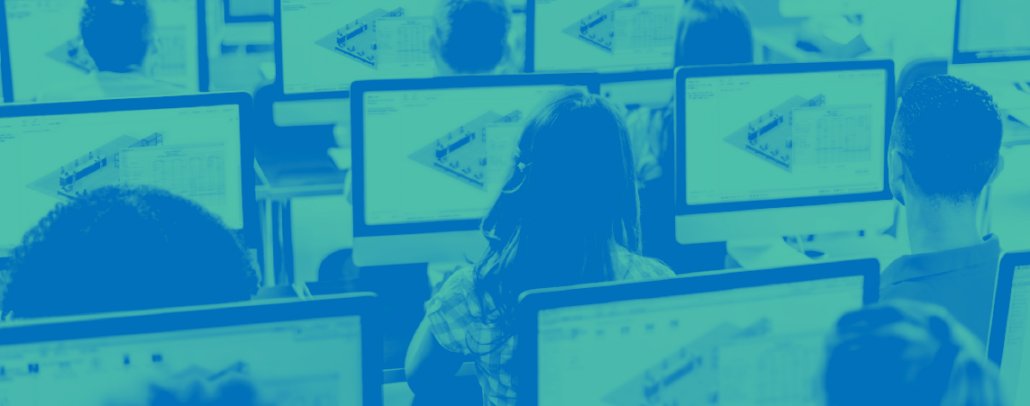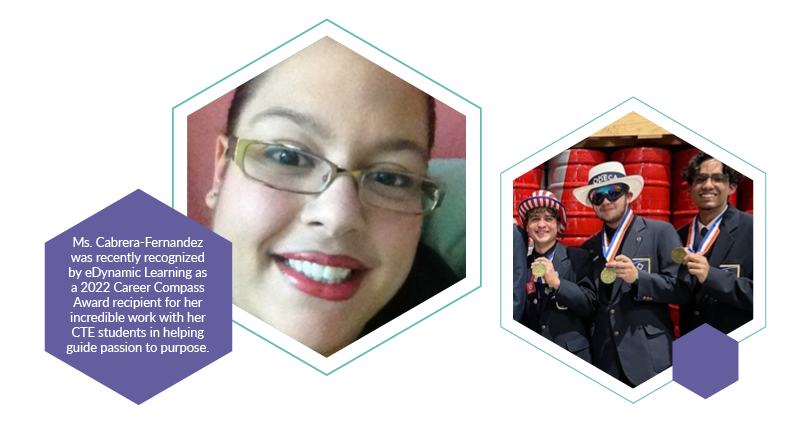Helping Students Gain Financial Literacy Skills for Career and Beyond – Yoelin Cabrera-Fernandez, Featured Educator

Featured Educator
Yoelin Cabrera-Fernandez – Academy of Finance & Banking Teacher, Southwest Miami High School – Miami, Florida
Click here for a printable PDF of this article

Exposing Students to the Real World
In the heart of Miami, Florida sits Southwest Miami Senior High School where high school teacher, Ms. Yoelin Cabrera-Fernandez, teaches personal finance and accounting. The school is located in the middle of the city and surrounded by residences, which Ms. Cabrera-Fernandez refers to as “a hidden gem”. Their school is predominantly Hispanic with many of the students being English Language Learners. Ms. Cabrera-Fernandez has been teaching for 20 years and has been at Southwest Miami Senior High School for the past eight years.
She originally got a degree in elementary education and after teaching for a while, was able to work with different levels of students. While doing this, she realized how much she enjoyed working with students at the high school level. She said nothing makes her happier than seeing her students excel, succeed, and reach their goals. She stays in contact with many of the students she taught, mostly through LinkedIn. Some of them have gone on to pursue majors and careers in accounting, finance, and computer science, and many claim they fondly remember the Knowledge Matters simulations that they used in her class.
As a teacher, Ms. Cabrera-Fernandez explains that she cares more about simply teaching materials to her students, and sincerely hopes to prepare them for their future endeavors and inspire them to reach their full potential. Her biggest challenge, though, is helping them realize how capable or how intelligent they are.
“They can have big hopes and dreams… because we’ve got some really smart, talented kids in our program. I’m really, really blessed with that.”
To accomplish this, Ms. Cabrera-Fernandez tries to expose her students to as many opportunities as she can. She works on college and career readiness skills to help prepare them for what they like to call “life after Southwest.” She finds they are very protected in their high school and wants to make sure her students are ready for whatever path they choose in life, whether that be post-secondary education, the armed forces, or the workforce. Her goal is to facilitate career exploration and foster a collaborative classroom reminiscent of the real world.
“Whatever it is they choose, they can take with them that financial knowledge which we hope prepares them for important financial decisions in life.”
To help her reach her goals and expose her students to various career options, Ms. Cabrera-Fernandez incorporates the Knowledge Matters Virtual Business simulations into her personal finance and accounting courses alongside her partner at their school. To keep her students engaged, she tries not to do too much lecturing. She keeps her instruction short, and then gives them time to practice. Then she comes back and discusses with the class how they think things went. At this point she determines if they need more time to review or if they are ready to move on. Sometimes she ends the class with an exit quiz so that she can make sure that they’ve grasped the concept or sometimes she ends with the simulation to allow them to test and apply the concepts.
Working Together Through Challenges
One aspect she finds her students truly enjoy is how challenging the simulations are. Financial literacy is not an easy curriculum, but her students enjoy piecing it together and having the ability to put into practice the different business structures she teaches them in her class. After the lesson, she has the students work through the Virtual Business Entrepreneurship simulation so they can test what works or what does not work. She explains that it is very different for them to see a business in action compared to just hearing her teach the lesson. Do they need to raise or decrease income or change their inventory to see a change in profit?
Her students also start networking when they see their businesses not working. Ms. Cabrera-Fernandez allows her students to work in pairs when the simulations get difficult. She stresses to the students that they should not be sharing the answers but giving thought provoking questions to help navigate through the challenges. She compares it to what they will experience after school.
“Like in real life, when we have a challenge or a struggle, we go to our peers or somebody higher above and we’ll network.”
Taking Skills to an International Level
Another way she brings the real world into her classroom is through the Virtual Business Entrepreneurship simulation, which she uses to inspire her students to participate in the Knowledge Matters Virtual Business Challenge. If their scores are high enough, qualifying students get to go to an annual conference and compete. The winners of the challenge are offered a scholarship, which they compete for through the simulations on a national level at DECA’s International Career Development Conference (ICDC).
Ms. Cabrera-Fernandez makes sure to encourage students to give their best effort in the simulation in hopes they will do well in the competition. She said the competitive experience and preparation provides one more way to engage and motivate her students in her classroom.
“I think that the trip to ICDC really does open their eyes to the world that’s out there. I can’t teach that in my classroom. And the simulation is the vehicle used for that.”
Students Finding Success
Just last year she took two accounting teams and one entrepreneurship team to ICDC in Atlanta, GA. One of her accounting teams placed third internationally, and the other two teams made it on stage to be recognized in the top ten. She describes how excited her students were to be there and how they were also able to do quite a few fun activities in the city of Atlanta during their visit. She hopes this year a few more students from different grade levels will qualify and grow the excitement for more students in the future. She says it is hard for them to understand the competition until they see it for themselves.
“You tell them, “Hey, let’s go to ICDC!”, but they don’t really understand what that means. Hopefully this year I can get students from different grades qualifying so that they can be ambassadors because once they go, they love it and they want to go year after year.”
Helping Students Outside of the Classroom
The simulations and the experiences they offer also helped her students in ways she had not expected. During the lockdown due to COVID-19, she leaned on the simulations as a source of stability for her students. Since her students had already become accustomed to working on the simulations, it was a seamless transition for her to assign them and for students to be able to work on them outside of the classroom. To maintain their attention and engagement, she utilized the built-in tools that the Knowledge Matters simulations offer. For example, she measured lesson progress, goal attainment, concept mastery, and the time students spent staying on task. She also downloaded the Student Progress Report which provided reading quiz results, math quiz results, and measured whether the students met their goals. The data analysis tools make student monitoring simple. Since students know she will be reviewing the reports, they know they need to complete assignments and participate in the simulations. During her time spent with her students at ICDC, she realized the impact COVID had on them.
“All of my students were at home for so long because of COVID. One of the young women told me, ‘I’ve talked more on this trip than the whole school year.’ I could see the girl’s maturity and how the simulation opened the door for her to have these experiences. Just seeing that spark light up was phenomenal.”
Simulations Provide an Opportunity for Career Exploration
In addition to being motivated to compete in the simulation competitions, many students are often led to a career field they wish to pursue through Ms. Cabrera-Fernandez’s class and the simulations. For example, from her current graduating class one student wants to be a forensic accountant, one student wants to be an actuary, and many students want to go into the fields of business and finance. She hopes to have a few accountants in that group but is grateful they are at least showing strong interest. Many are picking their major for university in these fields after using the Knowledge Matters simulations in her class. Early in the school year, she guides students through a career discovery and exploration unit where they create resumes, business cards, explore majors, research job outlooks, starting salary, etc. This exercise, accompanied with the simulations, gives her students perspective on different career opportunities.
“I believe that they realize the simulations give them some sort of warm up because they are now learning from the field perspective. It’s a way to expose them to another career instead of just listening to me talk about another career. They can see real life examples of what it could be like,” says Ms. Cabrera- Fernandez. She finds that Knowledge Matters is quintessential in fostering an environment where students feel challenged, improve their interpersonal skills, and immerse themselves in real world scenarios that prepare them for the road ahead. She loves to celebrate their accomplishments in class and highlight student success.
Thankful for Career Readiness Resources
Ms. Cabrera-Fernandez is grateful to the Miami-Dade Career and Technical Education department for believing in the Knowledge Matters product line and providing it to her students. When she started at Southwest, she was introduced to the simulations by a former colleague who used them in her classes. She quickly saw the value of using the simulations and implemented them into her curriculum.